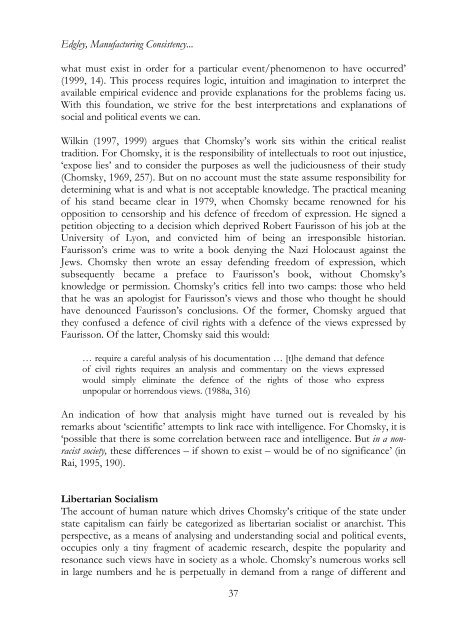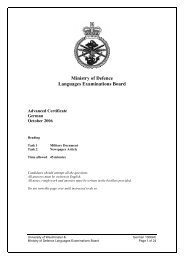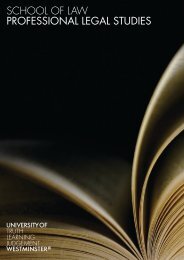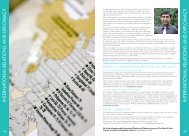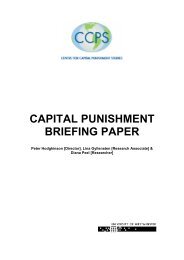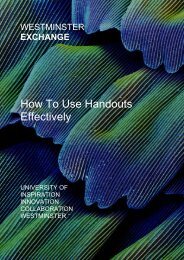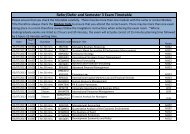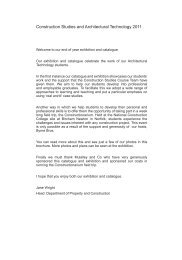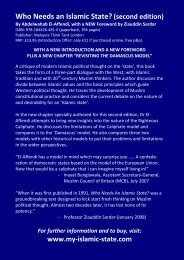Westminster Papers in Communication <strong>and</strong> Culture 6(2)Here is another source of discontent with Chomsky among the academiccommunity. Having pointed out how so many apparently enlightened citizens areregularly subject to the influence of the propag<strong>and</strong>a model, which disguises thereal intentions <strong>and</strong> outcomes of American foreign policy, he now accusesmembers of the intelligentsia of st<strong>and</strong>ing in the way of better underst<strong>and</strong>ing ofarrangements <strong>and</strong> events in the world it has been their professional choice toexplore <strong>and</strong> explain. Wilkin argues that, for Chomsky: ‘the science in social scienceis invariably used as a mechanism for excluding the general populace from debateabout issues such as social policy <strong>and</strong> foreign policy’ (1999, 14). Indeed, thepropag<strong>and</strong>a model makes a second-order prediction that it will be ignored.Journalists compound the exclusion of ordinary people from meaningfulcomprehension of policy by applying ‘codes <strong>and</strong> conventions’ that ignore thestudy of institutions <strong>and</strong> how they function, preferring a focus on events that canunfold <strong>and</strong> acquire meaning quickly, apparently to ensure accessibility (Galtung<strong>and</strong> Ruge, 1970). Chomsky is on the side of the average citizen, <strong>and</strong> questions thepresumption that ordinary people cannot digest the assumed complexities of social<strong>and</strong> foreign policy:… [w]hen I’m driving, I sometimes turn on the radio <strong>and</strong> I find very often thatwhat I’m listening to is a discussion of sports. These are telephoneconversations. People call in <strong>and</strong> have long <strong>and</strong> intricate discussion, <strong>and</strong> it’splain that quite a high degree of thought <strong>and</strong> analysis is going into that. Peopleknow a tremendous amount. They know all sorts of complicated details <strong>and</strong>enter into far reaching discussion about whether the coach made the rightdecision yesterday <strong>and</strong> so on. These are ordinary people, not professionals, whoare applying intelligence <strong>and</strong> analytic skills in these areas <strong>and</strong> accumulating quitea lot of knowledge <strong>and</strong>, for all I know, underst<strong>and</strong>ing. (Chomsky, 1988b, 33)Such scepticism about the ideologically laden nature of much that passes for socialscience (the very thing of which he st<strong>and</strong>s accused) does not mean we cannotexpect scientific rigour in both the natural <strong>and</strong> social sciences. It will mean, givenhis account of human nature, that social science is unlikely to be as predictive <strong>and</strong>explanatory as physics, because there will remain important differences betweenthe natural <strong>and</strong> social worlds. And here Chomsky posits a further essentialistelement to our human natures, because he argues we are hard-wired with acapacity for ‘abduction’ (Chomsky, 1981b). ‘Abduction’ refers to the humanpredisposition to construct theories about the social <strong>and</strong> natural world, theoriesfor which we can devise tests, both for logical consistency <strong>and</strong> in relation toevidence (<strong>Edgley</strong>, 2005). It is ‘a process in which the mind forms hypothesesaccording to some rules <strong>and</strong> selects among them with reference to evidence, <strong>and</strong>presumably, other factors’ (Chomsky, 1981b, 136). Wilkin argues that Chomskyshares with scientific realists (an approach that methodologically brings togetherthe natural <strong>and</strong> social sciences) a concern with ‘locating the structures <strong>and</strong>mechanisms that help to generate concrete outcomes or events; underst<strong>and</strong>ing36
<strong>Edgley</strong>, Manufacturing Consistency...what must exist in order for a particular event/phenomenon to have occurred’(1999, 14). This process requires logic, intuition <strong>and</strong> imagination to interpret theavailable empirical evidence <strong>and</strong> provide explanations for the problems facing us.With this foundation, we strive for the best interpretations <strong>and</strong> explanations ofsocial <strong>and</strong> political events we can.Wilkin (1997, 1999) argues that Chomsky’s work sits within the critical realisttradition. For Chomsky, it is the responsibility of intellectuals to root out injustice,‘expose lies’ <strong>and</strong> to consider the purposes as well the judiciousness of their study(Chomsky, 1969, 257). But on no account must the state assume responsibility fordetermining what is <strong>and</strong> what is not acceptable knowledge. The practical meaningof his st<strong>and</strong> became clear in 1979, when Chomsky became renowned for hisopposition to censorship <strong>and</strong> his defence of freedom of expression. He signed apetition objecting to a decision which deprived Robert Faurisson of his job at theUniversity of Lyon, <strong>and</strong> convicted him of being an irresponsible historian.Faurisson’s crime was to write a book denying the Nazi Holocaust against theJews. Chomsky then wrote an essay defending freedom of expression, whichsubsequently became a preface to Faurisson’s book, without Chomsky’sknowledge or permission. Chomsky’s critics fell into two camps: those who heldthat he was an apologist for Faurisson’s views <strong>and</strong> those who thought he shouldhave denounced Faurisson’s conclusions. Of the former, Chomsky argued thatthey confused a defence of civil rights with a defence of the views expressed byFaurisson. Of the latter, Chomsky said this would:… require a careful analysis of his documentation … [t]he dem<strong>and</strong> that defenceof civil rights requires an analysis <strong>and</strong> commentary on the views expressedwould simply eliminate the defence of the rights of those who expressunpopular or horrendous views. (1988a, 316)An indication of how that analysis might have turned out is revealed by hisremarks about ‘scientific’ attempts to link race with intelligence. For Chomsky, it is‘possible that there is some correlation between race <strong>and</strong> intelligence. But in a nonracistsociety, these differences – if shown to exist – would be of no significance’ (inRai, 1995, 190).Libertarian <strong>Social</strong>ismThe account of human nature which drives Chomsky’s critique of the state understate capitalism can fairly be categorized as libertarian socialist or anarchist. Thisperspective, as a means of analysing <strong>and</strong> underst<strong>and</strong>ing social <strong>and</strong> political events,occupies only a tiny fragment of academic research, despite the popularity <strong>and</strong>resonance such views have in society as a whole. Chomsky’s numerous works sellin large numbers <strong>and</strong> he is perpetually in dem<strong>and</strong> from a range of different <strong>and</strong>37


